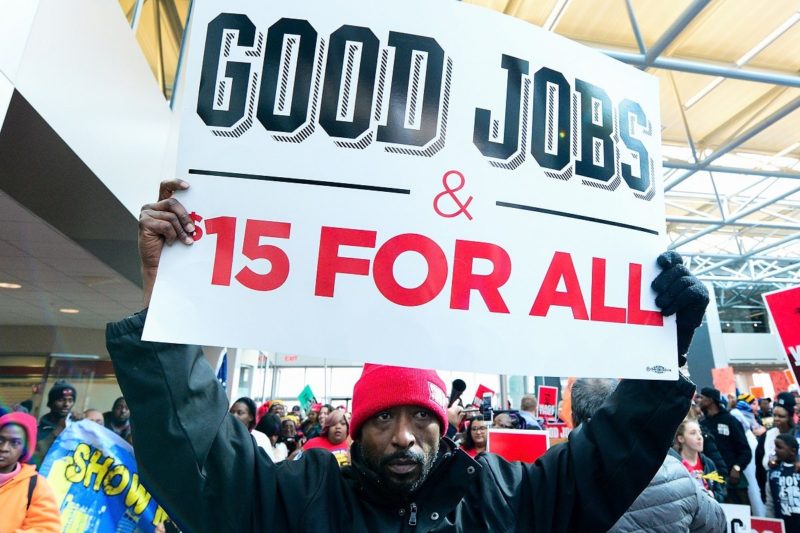‘It’s a Civil Rights Issue’: Workers Will March for a Living Wage
“I think there has been a long struggle to dignify wages for Black and brown people. If we are not paying all people enough to lead full lives then we are thwarting democracy,” said Kayla Reed with the Movement for Black Lives.

A mother of three boys, Angelic Cathey works at a McDonald’s in Memphis. She makes $7.25 an hour. On Tuesday, she will be among thousands of workers marching for a living wage in Memphis, where Martin Luther King Jr. came to support workers almost half a century ago.
To commemorate King’s assassination on April 4, 1968 at a Memphis hotel, workers in more than two dozen cities will rally this April 4 in protests that will culminate in a march to the Lorraine Motel in downtown Memphis, where they plan to hold a memorial.
The action combines efforts of the Fight for $15 movement and the Movement for Black Lives to emphasize that economic and racial justice are still intertwined, just as they were in 1968 for the Black sanitation workers on strike that King came to Memphis to support.
“We want to honor his legacy and fight what’s been going on for 50 years. The time is now to fight poverty, discrimination, and racism,” Cathey told Rewire. “We are all different people, of different faiths, of different color, and we all stand for justice.”
For Betty Douglas, a McDonald’s worker from St. Louis who is paid $7.90 an hour after nine years on the job, “This is not a working wage at all.”
With three children and other relatives to provide for, Douglas told Rewire she knows firsthand the struggle to pay rent and bills at the end of the month, and the experience of weighing whether she should buy groceries or gas. If she can’t drive the car, she certainly can’t afford a bus pass. “It’s terrible, it’s crazy, it’s no way to live,” she said.
Douglas is headed to Miami and said she hopes the action will bring the change working families need to survive in the United States. “We deserve to get a fair wage. We deserve dignity. We deserve to be comfortable,” she said. “We are all one step away from being homeless. It’s a civil rights issue.”
Gender and racial justice advocates will join the nationwide “Fight Racism, Raise Pay” action on the 49th anniversary of King’s assassination.
Kayla Reed with the Movement for Black Lives runs the St. Louis Action Council. She told Rewire it’s necessary but sad that people still need to march for workers rights and a living wage decades after King’s visit with workers in Memphis. The April 4 action, with its focus on a living wage for workers who are disproportionately people of color, will once again bring together two urgent movements intersecting racial justice and economic justice.
“I think there has been a long struggle to dignify wages for Black and brown people. If we are not paying all people enough to lead full lives then we are thwarting democracy,” she said. “It is a hard reality we are marching for in the streets, but what is beautiful about it is that we are still working towards a better world for our children.”
This is an opportunity for advocates to demand equal pay for women. The gender pay gap exists because of patriarchy, sexism, and racism, especially for women of color, and it differs with ethnicity, said Tracy Sturdivant, co-founder and co-executive director of Make It Work, an organization advocating for workplace policies that would advance economic security for women and working families.
A woman working full time is paid around 79 cents for every dollar a man earns. The amount decreases further for women of color—about 60 and 55 cents for Black and Latina women, respectively, she told Rewire.
On average, a woman loses almost $11,000 per year because she isn’t a man. April 4 also marks Equal Pay Day, the day each year that the average woman’s earnings catch up to a man’s earnings the previous year. Equal pay is an issue of economic justice, just like a livable minimum wage.
“This country is a nation built on the idea that all people are equal. So, paying people fairly should not depend on gender or race,” Sturdivant said. “If we are a country that values equality then we will do something about the gender pay gap.”
The popular perception is that people working at fast food stores are kids in high school and college, not working people with families like Cathey and Douglas. Raising the minimum wage to at least $15 per hour will help shrink the gender difference in pay by at least 5 percent, according to the Make It Work campaign.
Workers in Memphis were harassed and threatened by police for participating in a nationwide day of protest in 2014. A Fight for $15 fast food worker organization recently filed a lawsuit against the City of Memphis and its police department.
Participants in Tuesday’s protest told Rewire that it is time policy makers step up for hard-working families who are unable to take care of their basic needs on a $7.25 per hour salary despite working long hours, weekends, and overtime.
“This is not about color. This is about a serious systemic problem,” said Cathey, who joined the Fight For $15 in its early days in Memphis. “America is ignoring the issue but I am here to shine the spotlight on fair wages and poverty, just like Dr. King did 50 years ago.”

